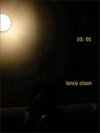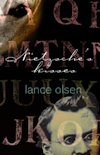Lance Olsen’s ability to create multiple world views has been noted by reviewers
before. It is a protean facility, a little crazy, dauntingly smart about human nature
and unpretentiously wise about character. How does one slip so smoothly into a dozen
or more psyches and create a convincing sense of omniscience without our questioning
the form or at least doing a skeptical double take? Go ask Tolstoy or George Eliot.
There are authors who can just do it.
|
Chiasmus Press

See also Amazon
|
Olsen has made a habit of playing Proteus, taking his changeable nature to new and
slippery slopes as he did in 10:01 (Chiasmus Press, 2005), popping in and
out of nearly 200 characters gathered together in a theater at the Mall of America to
watch a film. As Alvin Greenberg noted:
“All America comes...to settle in (or not)...to fantasize, to make out, freak
out, speed out (to themselves, their cell phones, each other, their absent partners,
to the world at large)...[where] life seems so inadequate simply because you can’t
look at it through a frame like you can a movie.”
|
|
Fc2, U of Ala Press

See also Amazon
|
In his next offering, Nietzsche’s Kisses (Fiction Collective Two, 2006),
Olsen gives us one main character from a dozen points of view, all views living inside
one head—Nietzsche’s. We see him in various fragmentations as he carefully,
minutely “kisses” his way towards a future. Yes, he’s mad as a
hatter and yet, nevertheless, we see (through the misfiring synapses) the many layers
of human foibles, unsubstantiated beliefs, philosophical speculations, the megalomaniac
propensities of all our egos that could lead any one of us into a hallucinatory
hell. We’re all just a genetic-flaw away from becoming the unconquered Dionysian
(Nietzsche) locked in madness and floating between stormy clarity and senile hallucination
as we drift through an eternity of metempsychosis and nothingness, our atoms longing
to kiss the cyclical future.
|
|
Counterpoint Press

See also Amazon
|
And now comes Anxious Pleasures: A Novel After Kafka (Counterpoint Press, 2007),
a haunting meditation on what if: What if Kafka had written “Metamorphosis”
from the father’s point of view; or the mother’s; or the sisters; or
the cook’s; or a sick sybarite named Hermann whose raison-d’être is
to seduce anything human that has a useful orifice; or how about making it Margaret’s
story? She’s a self-appointed Kafka scholar with a cynical sneer for those
not in the know. Which means everybody but Margaret, of course. She learns in
college—“about how the Czech author wrote...a mysterious parable about a man
who awoke one day as an insect. The more you studied it...the less you understood it.”
|
She also learns that a few short stories and a couple of reviews were all Kafka
published before he died at forty-one of tuberculosis. He believed his life a failure
and asked a friend, “Max Brod, to burn all his unpublished manuscripts.”
Where have we heard this before? Before Virgil died (or Vergil, if you prefer), he
asked that his unfinished masterpiece, Aeneid, be destroyed. You have to
admire his attitude: Perfection or nothing. In any case, what Brod burned of
Kafka’s works wasn’t everything. If he had, we wouldn’t have a
Kafka industry and scholars making their mark by misinterpreting him. As Margaret
writes in the course of her study: Kafka’s fiction appears to exist in
order to be misinterpreted.
What Olsen is magnificently able to do in this book is give all the timelines (present
and past), and points of view, and fashion them in such a way that we get a theater
of the absurd that is at once timely, comic, tragic, randomly hysterical, Priapusly
(sic) pungent, dreamy and sweet, insightful and intellectually satisfying—all
of it in finely modulated prose that shifts effortlessly from one inventive style
to the next as each character comes on stage and speaks herself/himself alive the
way Shakespeare said they should.
Following are a few brief renderings of this dictum provided by Olsen:
Grete [the sister] before she and her parents find the metamorphosed Gregor: I was
twelve. Then I was seventeen. Like dreaming or music, when you are gliding through those
years, they feel they will never end....[But eventually]: “It isn’t you
anymore. Imagine all the people you no longer are.
Mutti [the mother]: What in the world did he—couldn’t understand a word—if
he doesn’t get up soon he’s going to miss his train—and then where will we all
be—but the doctor—he told me have yourself a bit of a lie-down...—can’t
think of a single thing—except how my lungs are hardening.
Papa: He’s trying to make fools of us all, The Father thinks, fist falling a final
time against the white swing door. I simply won’t have it. Not in my house.
The Cook: Wouldn’t you know it: moment I sets this evening’s thick soup
to fart and flabber in its pot, gives the ingredients a chance to get to know each other
whilst I turns my attention to serving up breakfast, Anna [the Servant Girl] flutters in
in one of her flaps. —Hurry ma’am! She cries. Hurry! Gregor’s terribly ill
and can’t open his door...
The Servant Girl later: I lie here in the wee hours, the cook twitching in her sleep beside
me under our quilt, scaring myself with what he [Gregor ] might be doing in there.
And so it goes, more and more voices, multitudes individualized so well that in a few words
they reveal their personalities and the reason for their being in the book. Olsen is a writer’s
writer. He has much to say on how to create characters that come alive on the page and stay with us
after we’ve put the book down.
One wonders what in the world will Olsen do next. How can he top 10:01, Nietzsche’s
Kisses, and Anxious Pleasures? It would be a daunting task for any avant-gardist habitually
sawing the branch off behind him. Or should that be contemporary post-modernist-expressionist-impressionist
using a chainsaw to carve intricate leaves out of petrified logs? Whatever the metaphor, whatever the
lit-crit title, Olsen is in a class all by himself. Lonely are the brave.
is the author of nine books, including The Book of Mamie, which won the
AWP Award for Best Novel; The Holy Book of the Beard, named “an underground
classic” by The New York Times; Too Cool, a New York Times
Noteworthy Book; The Altar of the Body, given the Editors Prize Favorite
Book of the Year Award (South Florida Sun-Sentinel) and also a San Diego
Writers Association Award for Best Novel 2002.
He is the recipient of a National Endowment for the Arts award, Milwaukee
Magazine’s Best Short Story of the Year Award, and a Pushcart Prize Honorable
Mention. His book Minnesota Memoirs was awarded Best Short Story Collection at the
2013 Next Generation Indie Awards in New York City. His memoir, Murdering the Mom,
was a Finalist for Best Non-Fiction at the same Independent Publishers Awards.
Duff’s work has been translated into six languages.
www.duffbrenna.com